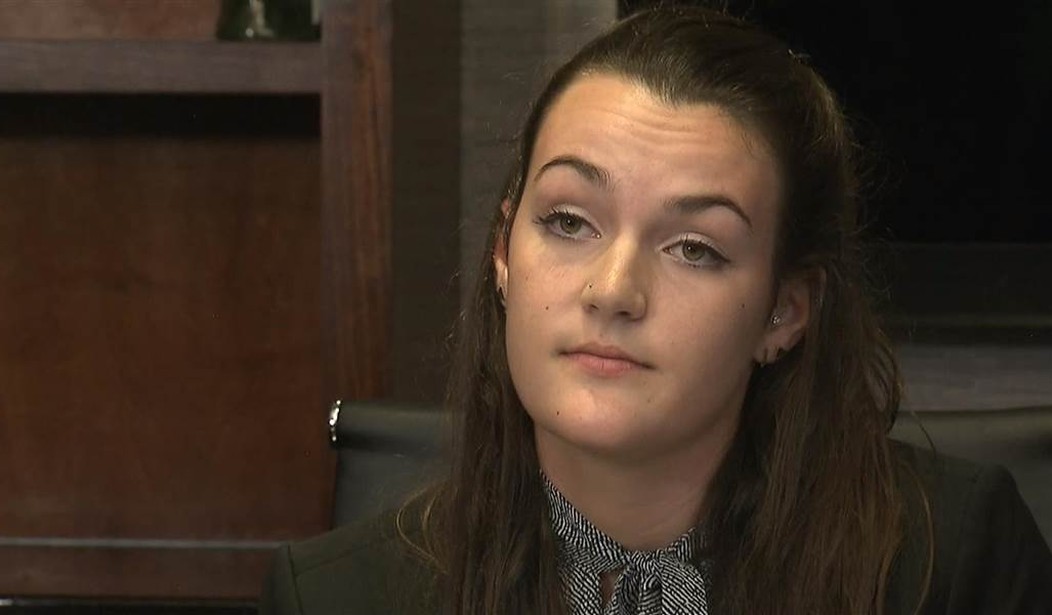A University of North Carolina at Chapel Hill football player who was accused of raping a fellow student in February has turned himself in to authorities. But he only took this step after the alleged victim was compelled to hold a press conference one day earlier, because she believed the university and law enforcement mishandled her case.
In this case, the accused perpetrator is black, and the alleged victim white.
After being served early Wednesday morning, Tar Heel linebacker Allen Artis was released on a $5,000 unsecured bond. He is scheduled for a court appearance Thursday morning.
UNC sophomore Delaney Robinson went public on Tuesday to talk about how Artis allegedly raped her on Valentine’s Day in an apartment complex. Robinson said she was making her case public to talk about what happened and to advocate change in how sexual assault victims are treated.
Robinson said the following during the press conference:
I did everything a rape victim is supposed to do. I reported it. I allowed the rape kit to be taken. I gave a statement. I cooperated with law enforcement and the Title IX office. But six months later the University has done nothing.
I’m taking this public stand not for me, but for the other students on campus who are not protected, despite what the University tells us. I love this University. It’s my home. I plan on graduating. But I expect the University to fulfill its promises to me and to all students.
After the alleged rape, Robinson went to the hospital. According to her attorney Denise Branch, a physical exam showed blunt force trauma to Robinson’s genitals and bruises on her neck.
Robinson, who had been drinking that night, said she takes “responsibility for that”:
But [her intoxication] doesn’t give anyone the right to violate me. I did not deserve to be raped.
When she was interviewed by authorities in February, Robinson said they asked her “demeaning and accusatory questions” in which she was treated more like a criminal than a victim”:
Did I lead him on? Have I hooked up with him before? Do I often have one-night stands? Did I even say no? What is my sexual history? How many men have I slept with? I was treated like a suspect.
Later, when Robinson listened to recorded interviews by the UNC Department of Public Safety of Artis, her “humiliation turned to anger”:
Rather than accusing him of anything, the investigators spoke to him with a tone of camaraderie. They provided reassurances to him when he became upset. They even laughed with him when he told them how many girls’ phone numbers he had managed to get on the same night he raped me. They told him, “don’t sweat it, just keep on living your life and playing football.”
Orange County District Attorney Jim Woodall told ABC11 Tuesday that the case was “investigated thoroughly”:
These are very serious cases. As we’ve seen in the past, sometimes cases like this — a lot of information comes out even after charges are filed so you have to be very careful and very deliberate whenever we’re investigating these cases. You never want someone accused unless there’s proof beyond a reasonable doubt — not just proof that something occurred — but proof beyond a reasonable doubt that a crime occurred.
Yet, it took Robinson’s press conference to get authorities to serve a misdemeanor warrant, which they did when he reported to the magistrate’s office Wednesday morning. He was also suspended from the team as of Tuesday, which is in keeping with UNC’s policies.
Despite Robinson’s request for warrants for misdemeanor assault and misdemeanor sexual battery, the district attorney refused to prosecute the case because of “sufficient physical evidence,” Branch said in a statement:
For more than six months we have asked the University and the Orange County District Attorney’s office to hold Delaney’s rapist accountable for his actions. At every turn we have been met with discouragement and delay.
While there should never be a rush to judgment, what I find curious about this case is the hypocrisy, not only relating to an athlete (many of whom, historically, have been protected because of their status as a valued player), but regarding the impact of race on this case — or the lack thereof.
Robinson is a white girl, and Artis is a black man. Justice — and not its opposite, “social justice” — is blind in relation to race. But in recent years, our society has been skewed when it comes to white on black crime, often convicting the alleged offenders — at least in the court of public opinion — with little evidence.
The Duke lacrosse case is a glaring example. The white players suffered significant personal losses merely by the accusation of raping a black girl. The case became sensationalized because of race, and the players were treated as guilty despite their innocence.
Such a rush to judgment should never happen, but I have to wonder how different this case would have been if Robinson had been a black girl accusing a white football player.
My guess is we would have heard about this case much sooner, and even now, after Robinson went public, there would be a lot more discussion about race in the media.
There is hypocrisy in our society when it comes to the relation between rape and race — something to remember the next time someone is judged harshly not because of the facts, but merely because of the color of his skin.









Join the conversation as a VIP Member